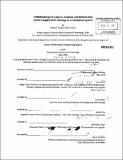| dc.contributor.advisor | Yossi Sheffi. | en_US |
| dc.contributor.author | Perez-Franco, Roberto, 1976- | en_US |
| dc.contributor.other | Massachusetts Institute of Technology. Engineering Systems Division. | en_US |
| dc.date.accessioned | 2011-05-09T15:31:32Z | |
| dc.date.available | 2011-05-09T15:31:32Z | |
| dc.date.copyright | 2010 | en_US |
| dc.date.issued | 2010 | en_US |
| dc.identifier.uri | http://hdl.handle.net/1721.1/62761 | |
| dc.description | Thesis (Ph. D.)--Massachusetts Institute of Technology, Engineering Systems Division, 2010. | en_US |
| dc.description | Cataloged from PDF version of thesis. | en_US |
| dc.description | Includes bibliographical references (p. 244-250). | en_US |
| dc.description.abstract | A variety of events inside a firm and in its environment can motivate managers to rethink their supply chain strategy. However, the evaluation and reformulation of a firm's supply chain strategy is not a trivial problem, and has no clear answer in the literature. Part of the difficulty stems from the 'elusiveness' of strategy, but additionally supply chain strategies are often left tacit, which makes their discussion more difficult. In this thesis we develop a better understanding of supply chain strategy and of the strategic imperative it is expected to support. We also present a methodology we developed, tested and refined to capture, evaluate and reformulate the supply chain strategy of a firm. For this, make extensive use of two research methodologies: grounded theory and action research. Working with a pool of 20 secondary case studies, we employ grounded theory to develop a better understanding of how the strategic imperative is articulated and communicated to the functions. Working on one particularly rich case study, we then develop a better understanding of supply chain strategy, and of how it serves as bridge between the operations in the field with the strategic imperative. This understanding was later tested and refined through two action research projects. Based on the literature, and adapting some principles from tested methodologies in other fields, we devise a methodology to capture, evaluate and reformulate the supply chain strategy of a firm. Our proposed methodology was tested and refined during our two action research projects . Our data sources during these projects included 68 interviews, eleven panel discussions, and six online questionnaires. The resulting methodology to capture, evaluate and reformulate a supply chain strategy is presented in this thesis, divided into three distinct yet interdependent phases. The first phase, 'capture', proposes steps to reveal and conceptualize a firm's supply chain strategy to render it explicit and tractable as a conceptual system. The output of the first phase, the 'Functional Strategy Map,' will serve as platform or the next two phases. The second phase, 'evaluation', assesses the merits and flaws of the firm's supply chain strategy in its current form along three dimensions: alignment, coverage and sufficiency. Central to our alignment evaluation is a tool we call 'evaluation matrices', which we compare to other matrix-form tools used in related fields, including the 'design structure matrix' (DSM) and the 'techniques-tools matrix'. The third phase, 'reformulation', proposes a novel approach to reformulate the supply chain strategy. This approach is built upon the principles of controlled convergence, yet operates using an original structure and a set of rules, amenable to the problem of supply chain strategy reformulation, devised to promote alignment, coverage and sufficiency. Every step of every phase is presented in full detail, and illustrated using examples from actual deployments, to facilitate the replication of this methodology by managers and by other researchers. The results and limitations of the methodology are discussed, and suggestions for further research are provided. Although the thesis is focused on supply chain strategy, we anticipate the methodology we have proposed should be, for the most part, applicable to other sets of interrelated functional strategies. | en_US |
| dc.description.statementofresponsibility | by Roberto Joaquin Perez-Franco. | en_US |
| dc.format.extent | 250 p. | en_US |
| dc.language.iso | eng | en_US |
| dc.publisher | Massachusetts Institute of Technology | en_US |
| dc.rights | M.I.T. theses are protected by
copyright. They may be viewed from this source for any purpose, but
reproduction or distribution in any format is prohibited without written
permission. See provided URL for inquiries about permission. | en_US |
| dc.rights.uri | http://dspace.mit.edu/handle/1721.1/7582 | en_US |
| dc.subject | Engineering Systems Division. | en_US |
| dc.title | A methodology to capture, evaluate and reformulate a firm's supply chain strategy as a conceptual system | en_US |
| dc.type | Thesis | en_US |
| dc.description.degree | Ph.D. | en_US |
| dc.contributor.department | Massachusetts Institute of Technology. Engineering Systems Division | |
| dc.identifier.oclc | 718622038 | en_US |
